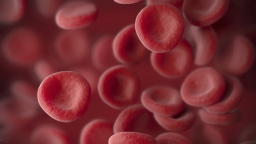|
Journal Article Cites HemoVoid™ in Post-translational Changes in Red Cell Proteomic Study Biotech Support Group reports on a recent journal article describing the simplicity and efficiency of their hemoglobin depletion technology for enriching the red cell proteome, to study post-translational modifications in erythrocytic diseases. News Release Journal Article Cites HemoVoid™ in Post-translational Changes in Red Cell Proteomic Study MONMOUTH JUNCTION, NJ, February 13, 2020 -- Biotech Support Group reports on a recent journal article describing the simplicity and efficiency of their hemoglobin depletion technology for enriching the red cell proteome, to study post-translational modifications in erythrocytic diseases. The citation is: Bollenbach, Alexander, et al. "GC-MS and LC-MS/MS pilot studies on the guanidine (NG)-dimethylation in native, asymmetrically and symmetrically NG-dimethylated arginine-vasopressin peptides and proteins in human red blood cells." Journal of Chromatography B (2020): 122024. Protein-arginine methyltransferases catalyze the methylation of the guanidine (NG) group of proteinic L-arginine (Arg) to produce monomethyl and dimethylarginine proteins. Upon proteolysis, free amino acids monomethylarginine (MMA), symmetric dimethylarginine (SDMA) and asymmetric dimethylarginine (ADMA), respectively are released. Previous studies showed that human red blood cells are rich in large (> 50 kDa) ADMA-containing proteins of unknown identity. The study aimed to report the Identity, biological activity and concentration of NG-methylated proteins by using GC-MS and LCMS/MS approaches. The article states “we included in our method the use of HemoVoid cartridges to remove specifically most erythrocytic hemoglobin and to improve the SDS-PAGE separation of proteins for further processing. The HemoVoid cartridges, … allowed removal of erythrocytic hemoglobin to a large extent from the hemolysate. … removal of hemoglobin by this technique enabled an effective separation by SDS-PAGE and isolation of bands, presumably by avoiding overloading of the gels by hemoglobin.”. The article concludes that the LC-MS/MS proteomic study identified several membrane and cytosolic erythrocytic NG-dimethylated proteins, including spectrin-α (280 kDa), spectrin-β (247 kDa) and protein 4.1 (80 kDa). Furthermore, that the newly identified main targets for NG-dimethylation in human erythrocytes should be given a closer look in erythrocytic diseases like hereditary spherocytosis.
For more information on HemoVoid™, visit: http://www.biotechsupportgroup.com/HemoVoid-Hemoglobin-Depletion-From-Erythrocytes-p/hvk.htm For more information of all of our Hemoglobin removal products, visit: https://www.biotechsupportgroup.com/Articles.asp?ID=452 About Biotech Support Group LLC Converging with cultural and technological disruptions forthcoming in healthcare, Biotech Support Group develops methods for cost effective and efficient sample prep essential for these expanding markets. Following a tiered business strategy, the company continues its growth in the consumable research products area supporting the rapidly expanding installation of LC-MS instrument and computational infrastructure. For this market, key products include: AlbuVoid™ and AlbuSorb™ for albumin depletion, Cleanascite™ for lipid adsorption, HemogloBind™ and HemoVoid™ for hemoglobin removal, and NuGel™ for functional proteomics. From these innovations, the company has acquired knowledgebase and biomarker intellectual property assets that support discoveries of protein markers from blood, with special emphasis on early detection and personalized medical decisions for cancer patients. For more information, go to http://www.biotechsupportgroup.com
|

- About
- Products
- Hemoglobin Removal Kits
- Lipid Removal & Clarification
- Urine Protein & Low Abundance Enrichment
- Class Specific Enrichment
- Sample Prep Mass Spectrometry
- Functional & Chemical Proteomics
- Genomic Sample Prep
- Accessories
- Technical Resources
- References
- Publications & Reports
- FAQs
- Case Studies
- Cleanascite™ Unlocks Insights into Lipid-Driven Tumor Immunosuppression
- NRicher™ Bead Platform Provides Unique Sub-Proteome Biases And Fit For Purpose Opportunities for Targeted LC-MS Quantification
- BSG Products To Assist in Analyzing Macrophage Polarization
- Ectodomain Shedding and Enrichment of the Soluble Membrane Proteome
- Investigate out of the Venn Diagram box
- Methods to selectively deplete or purify Hemoglobin from Dried Blood Spots (DBS)
- The Utility of HemoVoid™ is Demonstrated in 3 Proteomic Investigations Identifying Potential Disease Specific Biomarkers
- The 4 common features of our sample prep products, known as the BSG Advantage, are highlighted in a selection of journal references.
- AlbuVoid™ Workflows Advance Cell Secretome Proteomics
- Lipid Removal for Phenotypic Cell Response in Cancer Research
- The Influence of Sample Prep Bias on LC-MS Targeted Peptide Quantification in Serum Proteomics
- Re-imagining proteomics for developing precision medicine biomarkers of the innate immune response in SARS-CoV-2
- Patent Application Describes New Proteomic Methods to Monitor Protease Inhibitor Function During Covid-19 Infections
- Efficient Hemoglobin Removal Advances Red Cell Proteomics Offering Many New Insights Into Inflammation and Infectious Disease
- The Potential for New Blood Biomarkers in the Management of COVID-19 Disease
- Establishing the Utility of HemoVoid™ and HemogloBind™ as Enrichment Tools for Proteomic Analysis of Red Cells and Whole Blood in Parkinson’s Disease
- Species Diversity Supported By BSG Products
- Poster Report Describes Loss of Functional Serpin Activity In Cancer Patient Blood
- AlbuVoid™️ PLUS & AlbuSorb™️ PLUS Evaluating Different Windows of Observation Solves The Many Challenges of Serum Proteomics
- Tackling the Challenges of Serum Proteomics
- Lipid Removal Sample Prep for Cell Response Applications
- Sample Prep for Proteomic Analysis of Saliva
- Biotech Support Group Featured in Book, "Functional Proteomics – Methods and Protocols"
- Sample Prep Liquid Biopsy Products Suitable for Proteomic Profiling of a Variety of Body Fluid Sample Types
- Albumin and High Abundance Depletion
- Using HemogloBind™ as a Hemoglobin Binding Reagent
- Diverse technologies available for researchers to selectively bind or enrich exosomes and extracellular vesicles.
- Stroma Liquid Biopsy™ Biomarkers Profile Pan-Cancer Dysregulation of the Serum Proteome
- Diverse Depletion and Enrichment Technologies Enhance Simplicity and Efficiency of Obtaining Quality Proteomic Information
- Use On-Bead Digestion to Improve Time Required for Serum Digestion
- Using AlbuVoid™ as a Serum Protein Enrichment Kit in Functional Proteomics
- Using Cleanascite™ as a Lipid Absorption and Clarification Reagent
- Using HemoVoid to Remove Hemoglobin Before Analysis
- Blog
- Contact
- Liquid Biopsy
